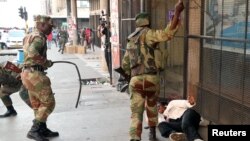President Emmerson Mnangagwa has appointed a seven-member committee, which includes former South African president Kgalema Motlanthe and several lawyers, to look into the disturbances early this month in Harare that led to the killing of six Zimbabweans by the Zimbabwe National Army.
Addressing journalists today, Mnangagwa said, “In fulfilment of what I have earlier on undertaken to do, in order to address the matter in a transparent manner and in the public interest, I have appointed a seven-member Commission to inquire into the post-election violence. The Commission is made up of Local, Regional and International members who have been appointed in terms of the Commission of Inquiry Act [Chapter 10:07].”
He said the terms of reference for the Commission are to inquire into the circumstances leading to the 1st of August, 2018, post-election violence; to identify the actors and their leaders, their motive and strategies employed in the protests; to inquire into the intervention by the Zimbabwe Republic Police in the maintenance of law and order and to investigate the circumstances which necessitated the involvement of the military in assisting in the maintenance of law and order.”
The Commission is expected “to consider whether the degree of force used was appropriate to the ensuing threat to public safety, law and order; to ascertain extent of damage/injury caused thereof; to investigate any other matters which the Commission of Inquiry may deem appropriate and relevant to the inquiry; to make suitable recommendations; and to report to the president in writing, the result of the inquiry within a period of three months from the date of swearing-in of the Commissioners.”
Members of the national army shot and killed the six following public protests by some people said to be members of the MDC Alliance led by Nelson Chamisa, who took to the streets to express their anger over the delayed announcement of results of the July 30 presidential election.
Other members of the Commission of Inquiry are Rodney Dixon QC, an international lawyer who practices from Temple Garden Chambers in London and The Hague; Chief Emeka Anyaoku, former Commonwealth Secretary-General, Federal Republic of Nigeria; former Chief of Defence Forces of the Tanzania People’s Defence Forces, General Davis Mwamunyange; Professor Charity Manyeruke, Political Science, University of Zimbabwe; Professor Lovemore Madhuku, Faculty of Law, University of Zimbabwe; and Mrs. Vimbai Nyemba, former president of the Law Society of Zimbabwe.
This is the second Commission of Inquiry on the conduct of Zimbabwe National Army in over 30 years following the appointment of a similar commission in the 1980s, which was set up by former President Robert Mugabe following political disturbances in Matabeleland and Midlands province that left at least 20,000 people dead and thousands maimed or displaced.
The Commission of Inquiry into Fifth Brigade led by lawyer Simplicious Chihambakwe, which looked into the Fifth Brigade atrocities in the two regions was never made public.
The brigade, well-known as Gukurahundi, targeted members of the opposition PF Zapu party then led by Joshua Nkomo, who was accused by the government of allegedly attempting to topple the sitting president.
Nkomo denied the allegations claiming that Mugabe wanted to destroy PF Zapu in order to form a one party state. The violent crackdown on Zapu supporters ended in 1987 when Zanu and Zapu reached a unity agreement that led to the formation of a government, which incorporated some members of the Nkomo’s party.




